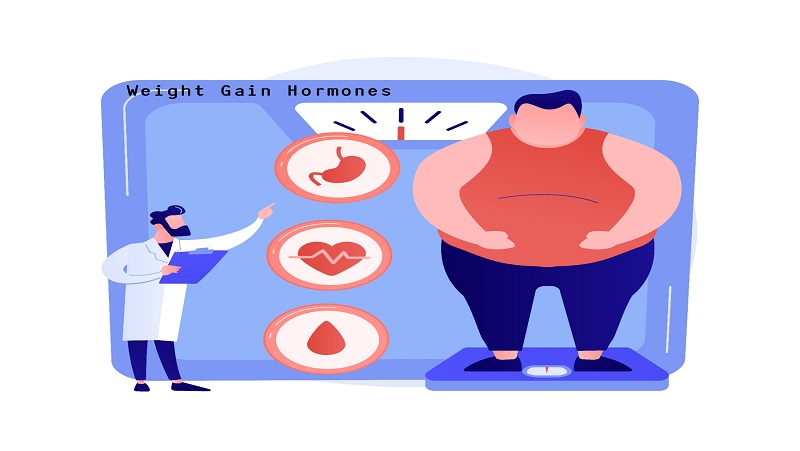Unable to lose weight? Your hormones could be the culprit!
Hormones are the chemical messengers that control nearly every process in our body. From growth to metabolism to mood and development, hormones play a crucial role in regulating various functions in our body. But did you know your hormones could be the reason behind your weight gain? In fact, hormones and weight gain are deeply connected.
Hormone dysregulation – when your body releases too little or too much of a hormone – can drastically affect your health and body weight too. That’s why, it is important to balance hormones for weight loss.
Let’s understand how hormones cause weight gain and how you can optimize their levels for healthy weight management.
Hormones That Affect Your Weight
Insulin
Insulin is an important hormone produced by the pancreas. It plays a crucial role in regulating blood sugar levels. Insulin helps our cells absorb glucose from the bloodstream, keeping your blood sugar levels within a healthy range. When insulin levels are high, especially after a meal, it signals cells to take up glucose for energy production. Excess glucose is converted into glycogen for storage in the liver and muscles. Once glycogen stores are full, the remaining glucose is converted into fat. This fat then gets stored in adipose tissue, leading to weight gain over time.
Leptin
Leptin, also known as the “satiety hormone,” plays a crucial role in regulating hunger in the body. When functioning properly, leptin helps to suppress the appetite by sending satiate signals to the brain. However, disruptions in leptin signaling (leptin resistance) lead to a reduced ability to regulate appetite. As a result, you may experience persistent feelings of hunger, even when your energy stores are full. This, in turn, leads to overeating and weight gain.
Unhealthy lifestyle habits, such as consuming high-calorie, low-nutrient foods, inadequate sleep, chronic stress, and sedentary behavior, can also disrupt the signaling of leptin hormones causing weight gain.
Ghrelin
Ghrelin is referred to as the “hunger hormone” of the body. It plays a significant role in the regulation of appetite and body weight. The hormone sends hunger signals to the brain and stimulates food intake. Imbalances in ghrelin levels lead to heightened feelings of hunger and a stronger urge to consume calorie-dense foods. Overeating, as we know, can lead to weight gain over time.
Ghrelin also interacts with other hormones involved in appetite regulation. Imbalance in these interactions also leads to weight gain.
Estrogen
Estrogen is a hormone that’s primarily associated with women’s reproductive health. It also plays a role in body weight management. Fluctuations or declines in estrogen levels, during menopause or conditions like PCOS, can lead to metabolic changes and weight gain.
Cortisol
Cortisol is the stress hormone, and stress we all know is a significant contributor to weight gain. Chronic stress can lead to elevated cortisol levels, which in turn can increase appetite, promote fat storage, and lead to cravings for high-calorie foods. High cortisol levels also interfere with insulin function, leading to insulin resistance and weight gain.
Thyroid Hormones (T3 and T4)
Another hormone that causes weight gain is the Thyroid hormone. Hormones T3 (triiodothyronine) and T4 (thyroxine) play a crucial role in regulating metabolism. However, they are also one of the popular weight gain hormones and low thyroid hormone levels (hypothyroidism) are significantly associated with weight gain.
On the other hand, hyperthyroidism (caused due to elevated thyroid hormone levels) can increase metabolism excessively, leading to weight loss despite increased appetite.
Testosterone
Testosterone is a hormone that’s primarily associated with masculine characteristics. However, it is also one of the hormones that cause weight gain. Low testosterone levels can contribute to weight gain, especially around the abdomen, and make it challenging to build and maintain muscle mass.
Serotonin
The “happiness hormone” serotonin is a neurotransmitter that plays multiple roles in the body. While it is not directly linked to weight gain, serotonin regulates mood, appetite, sleep, and various physiological functions. Low serotonin levels lead to stress, mood swings, and sleep apnea, which can all lead to unhealthy (emotional) eating and significant weight gain over time.
Growth Hormone
As the name suggests, growth hormone plays an important role in our growth, adolescence, metabolism, and body composition. While it is not a hormone that causes weight gain or weight loss, its impact on metabolism and body composition can influence weight management. Factors such as diet, exercise, sleep, and overall lifestyle play a crucial role in determining the relationship between the growth hormone and weight gain.
Adiponectin
Adiponectin is a hormone secreted by adipose tissue (fat cells). It plays a significant role in regulating glucose levels and fatty acid breakdown. Unlike other weight gain hormones, adiponectin has a beneficial effect on body weight and metabolism. Higher levels of adiponectin lead to improved insulin sensitivity, which means the body can better regulate blood sugar levels and use glucose for energy rather than storing it as fat.
Peptide YY (PYY)
Peptide YY (PYY) is a hormone produced in the gastrointestinal tract in response to food intake. Its primary role is to regulate appetite by sending signals of fullness to the brain. However, impaired PYY signaling may contribute to increased appetite and potential weight gain.
How to Balance Hormones for Weight Loss?
Resetting hormones for weight loss involves adopting healthy lifestyle habits. Here are some strategies that can help
- Consume a Balanced Diet: Focus on eating whole foods such as fruits, vegetables, lean proteins, whole grains, and healthy fats to prevent insulin resistance. Avoid processed foods, sugary snacks, and excessive alcohol intake, as they can disrupt hormone balance.
- Eat at Regular Intervals: To prevent weight gain, it is important to keep ghrelin levels (the hunger hormone) under check. Since ghrelin levels are the highest before meals, it is important to eat at regular intervals to prevent hunger pangs.
- Manage Stress: Practice stress-reducing techniques like meditation, deep breathing exercises, yoga, or mindfulness practices. Chronic stress can elevate cortisol levels, leading to quick weight gain.
- Get Quality Sleep: Aim for 7-9 hours of quality sleep each night. Poor sleep can disrupt hormone levels, particularly leptin and ghrelin, which regulate hunger and appetite.
- Regular Exercise: Engage in regular physical activity such as aerobic exercise, strength training, or yoga. Exercise helps improve insulin sensitivity, boost metabolism, and promote overall hormone balance.
- Stay Hydrated: Drink an adequate amount of water throughout the day to support metabolic processes and overall health. Dehydration can impact hormone production and metabolism.
- Limit Caffeine and Stimulants: Reduce consumption of caffeine and stimulants, as they can affect cortisol levels and disrupt sleep patterns.
- Manage Hormonal Conditions: If you are suffering from hormonal disorders like thyroid disorders or insulin resistance, work with your healthcare provider to manage these conditions effectively, as they can impact your weight.
- Avoid Crash Diets: Avoid extreme or crash diets that can negatively impact hormone balance and metabolism. Focus on sustainable, long-term lifestyle changes instead.
- Consider Supplements: Some supplements like omega-3 fatty acids, vitamin D, magnesium, and probiotics may support hormone balance and weight management. Consult with a healthcare professional before starting any new supplements.
- Seek Professional Guidance: Consult a board-certified obesity medicine physician, like Dr. Mona Lala, for personalized guidance and support. She can evaluate your existing health condition to check if you are gaining weight due to hormonal imbalance in the body and can provide tailored diet and exercise regimens to support your hormonal health and weight loss goals.
Consult the Best Weight Loss Physician in Chicago
Whether you want to restore hormonal balance, ensure healthy weight loss, or improve your overall well-being, we can help. Schedule a consultation with Dr. Lala and take the first step toward a healthier, happier you!




